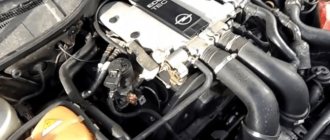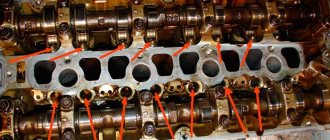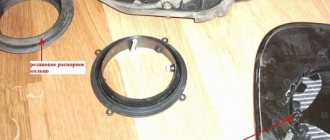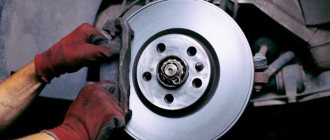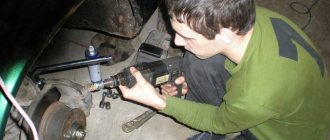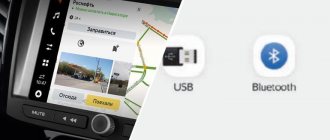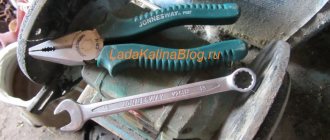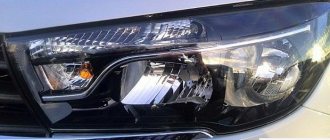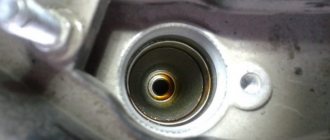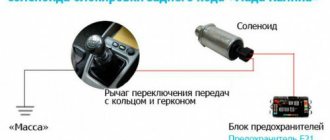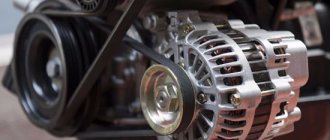Hi all! It is unlikely that anyone will argue with the fact that proper operation of the braking system is the key to the safety of every driver. Therefore, today we will continue this topic by talking about why the caliper is knocking, what to do in this situation and who is causing the noise.
Surely everyone knows that you should always monitor the degree of wear of the brake discs. We also talked to you about grooving brake drums, and also studied the nuances of grooving brake discs yourself. I don’t encourage you to do this yourself, but you must know the features and tasks of such procedures.
The caliper refers to the braking system of a vehicle. It comes in both front and rear. But in both cases, his treatment is carried out approximately according to the same scheme. And the reasons for the knocking are identical.
Why are the calipers knocking on the Lada Vesta?
The front and rear calipers on the Lada Vesta rattle for the same reasons, so the “treatment” schemes are the same. There are three objective sources of caliper noise.
Pad wear
Owners monitor the degree of wear of the pads (friction linings) when they change the brake fluid or every 2-3 thousand km.
Pad wear. Photo source: https://pricep-vlg.ru/remont-svoimi-rukami/stuchit-support-chto-delat/
What affects the abrasion of an element:
- The quality of the material depends on the manufacturer.
- Driving style - frequent and sharp braking accelerates depreciation.
- Operating conditions - off-road, sand, water, mountain roads - bring the time to replace the pads closer.
- The serviceability of the brake system - when the car has serviceable working cylinders and caliper guides, the wear of the pads occurs evenly.
- Anti-lock braking system - with it, the pads wear out more slowly.
- Transmission type - in cars with automatic transmission, the pads wear out earlier, because stopping is possible only when you press the pedal. On the “mechanics” they often brake the engine - the part wears less.
- Pad rigidity. Soft linings wear out faster, but the disc remains intact. Hard ones are the opposite: the disc suffers, but the pads hold up. The hardness of the pads is selected according to the series: sport, comfort, classic.
- Transport congestion - transporting heavy luggage and towing trailers has a detrimental effect on the condition of the friction layer.
How to determine the degree of depreciation:
- In move. If at low speed, hitting a speed bump, or driving on a dirt road, a knocking sound is heard, and disappears when braking, this indicates serious wear of the Vesta caliper. But similar symptoms plus beating in the pedal occur when the brake pads wear out or the disc is deformed - here replacing the calipers will not solve the knocking problem. When the pads are worn out, a characteristic squeaking pedal also appears.
- Visually. Remove the wheel and inspect the assembly. If the linings are worn out, replace the spare part.
According to the maintenance schedule, brake pads on Lada Vesta are diagnosed after 10-15 thousand km on the speedometer.
Blame the guides
An important element of the brake system - the caliper guides in the Lada Vesta - can also cause the part to knock.
Caliper guides in Lada Vesta. Photo source: https://krsk.au.ru/14177557-napravljajuschie-supporta-lada-vesta-largus/
There are two problems with the guides:
- Wear. The spare part is completely replaced.
- The nest (landing site) has developed. Then they buy repair rubber bands. Put on the pin, they stop the knocking of the unit.
Sometimes the noise of the part is eliminated with lubricant: the caliper guides with rubber rings on the Lada Vesta are removed from the socket, a layer of heat-resistant copper paste for highly loaded surfaces is applied (Wurth SU 800, HUSKEY 341 Copper Anti-Seize).
Fastenings have come loose
A malfunction occurs when the bolts are loosely tightened at the service station. Fasteners also become loose due to vibration of the car on bad roads.
It is enough to tighten the fastenings, thereby eliminating the knocking of the calipers on Vesta.
Tags: rattling calipers Logan, Largus
Comments 36
My father-in-law has a real looseness on one side of the whole bracket on Logan, it wobbles normally with his hand. What are the solutions?
I have a problem - it's fixed! There was a defective ball joint. Replacement under warranty.
It would be great to see in a photo! Yesterday I heard the rumble again, but in my opinion, it became even louder.
What kind of springs are they? And where did you put them?
I would like to add that these are purely my guesses. Perhaps I am wrong, but the reason is different. Could be: steering rack; maybe it’s the engine protection, it immediately touches the exhaust during vibration; maybe... who knows what... See for yourself.
I installed the springs and the knocking went away. Regarding the fact that you tightened the bolts, some kind of crap, they didn’t tighten it for you at the service center)))))
I also had a tapping sound at about 20,000 on the speedometer. When you turn it, either to the right or to the left, a rattling noise appears. I thought it was tie rod ends. Then it dawned on me - I was shaking the sport and heard this knock. I removed the wheels and unscrewed the steering wheel all the way so that I could get to the studs that secure the calipers (they are in rubber casings - upper and lower). I tightened them up by 3-4 turns each. The knock is almost gone. Almost, because on the right wheel there was sometimes a hint of knocking when turning, but not strong. I'll add more later. Something like this.
So they are not tightened or what, or how do you understand this, why can you still tighten them?
Don't know. This was done, as I believe, so that the brake linings do not jam. This is especially true if the car is new. As the linings wear, a gap appears, which causes the caliper's grip to weaken. A rattling sound appears. Actually, I get the impression that Sandero/Logan are not as great to use as they say. Another myth... In general, the machine is okay. But I expected better, to be honest...
Nothing can knock in the caliper, there is simply nothing there to knock, by definition. The pads are self-feeding, so there shouldn’t be any gaps there. The only thing that should be done periodically, at least once a year, is to lubricate the caliper guides. To do this, remove the wheel , turn the steering wheel to make it more convenient, and unscrew the two bolts of the bracket, there are only two of them on top, the key is 12 or 13, remove the bracket and take out the guides along with the rubber boots, wipe them of old grease, check for cracks on the boots and ruptures, lubricate the guides with silicone grease or lithol, and put everything in the reverse order. What you call the studs in the rubber casings are the bolts that secure the guides, they do not secure the caliper, they secure two 18 bolts, they are located lower on the inside . Extraneous sounds when turning can be made by CV joints; when they start to fail, a crunching sound appears. I have come across cases where the tires are installed wider than they should be, when turning they can scratch against the fender liner. So the reasons for the extraneous sounds are not in the brakes, especially when turning.
Now I understand this too. I turned out to have a defective right ball joint. After replacing it with the “butterfly” at the dealers under warranty, the knocking noise disappeared completely. Nevertheless - thanks for the comment and happy travels!
Yes, don’t take the QUARTZ repair kit, it won’t do any good (see my magazine). www.drive2.ru/l/7331836/
Now there are recipes: 1. Spring from the rear drums of the Oka. 2 holes are drilled and the spring is tensioned. 2. Plastic rings or spacers are placed on the guide. 3. They install Volgov and Gazelle ones. A groove may be needed. They gave me machined ones from the kings) The noise disappeared. But the pads rattle when you touch the brakes, sometimes you can hear a “plume”.
They “filled it” with lubricant and stopped rattling, I didn’t even understand what was rattling, the specialists found it on the vibration stand
